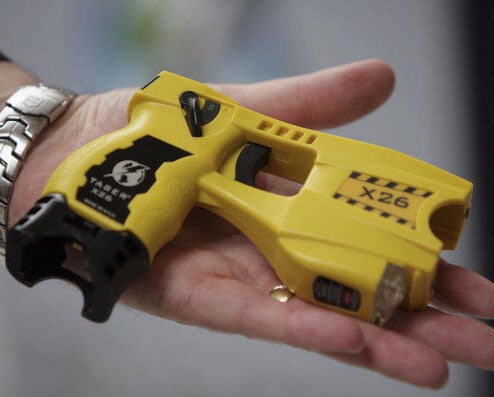Taser guns' impact on brain may undermine police questioning, study finds
'There are plenty of people in prison who were Tased and then immediately questioned'

Your support helps us to tell the story
From reproductive rights to climate change to Big Tech, The Independent is on the ground when the story is developing. Whether it's investigating the financials of Elon Musk's pro-Trump PAC or producing our latest documentary, 'The A Word', which shines a light on the American women fighting for reproductive rights, we know how important it is to parse out the facts from the messaging.
At such a critical moment in US history, we need reporters on the ground. Your donation allows us to keep sending journalists to speak to both sides of the story.
The Independent is trusted by Americans across the entire political spectrum. And unlike many other quality news outlets, we choose not to lock Americans out of our reporting and analysis with paywalls. We believe quality journalism should be available to everyone, paid for by those who can afford it.
Your support makes all the difference.Taser guns' impact on cognition and reasoning has been found to potentially interfere with police questioning.
A comprehensive study from the US discovered participants showed short-term decline in brain functioning equivalent to dementia after being shocked by the stun guns.
Lead author of the study, which is the first of its kind, Robert J Kane argued the findings challenge the long accepted legitimacy of police interrogation directly following Taser shocks.
“The findings of this study have considerable implications for how the police administer Miranda [the right to remain silent] warnings.
“If suspects are cognitively impaired after being Tased, when should police begin asking them questions? There are plenty of people in prison who were Tased and then immediately questioned.”
The report carried out by Arizona State University and Drexel University in Philadelphia found that Taser stuns significantly compromised a person’s mental state, with participants reporting problems concentrating.
On top of this, partakers experienced higher levels of anxiety and lower than average scores on memory and verbal tests.
“Being shocked had a traumatic effect on some participants. Some were emotionally debilitated by the experience.
”The findings from this study suggest that people who have been shocked with a Taser may be unable to understand and rationally act upon his or her legal rights, and may be more likely to waive their Miranda rights directly after Taser exposure,“ explained Kane.
Miranda rights are defined as the right to remain silent while being questioned by police.
In the US, over two million citizens have been Tasered by police. The guns have become the favoured less-lethal weapon to be used by state police departments.
The stun guns which impose a 50,000-volt shock are used in 17,000 police departments in America and have been known to cause death.
In February 2015, Calvon Reid died after two officers struck him in the chest and released 50,000-volt shocks to his body. Within seconds the 39-year-old stopped breathing and died two days later in hospital.
Join our commenting forum
Join thought-provoking conversations, follow other Independent readers and see their replies
Comments